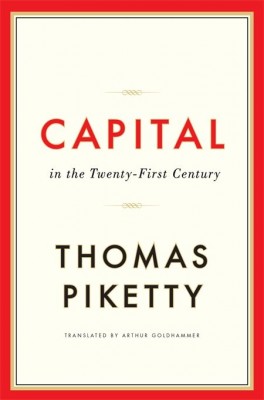 A book about economics is causing a sensation around the world. “Capital in the 21st Century” is by Thomas Piketty, a Frenchman who’s being described as a rock star economist. In 685 pages of often dry analysis, he reaches conclusions that are being seized on by the left and attacked by the right. He says that if we let capitalism run out of control, it will bring back levels of inequality not seen for a hundred years. It’s essential reading, but life’s too short. Andy Lewis has read it so you don’t have to:
A book about economics is causing a sensation around the world. “Capital in the 21st Century” is by Thomas Piketty, a Frenchman who’s being described as a rock star economist. In 685 pages of often dry analysis, he reaches conclusions that are being seized on by the left and attacked by the right. He says that if we let capitalism run out of control, it will bring back levels of inequality not seen for a hundred years. It’s essential reading, but life’s too short. Andy Lewis has read it so you don’t have to:
At an early stage in this book, we are told in some detail about the price of a kilo of carrots in France. From 1900 to 2010, the price of carrots evolved at the same rate as the overall price index. An average French worker could now buy 60 kilos of them with a day’s wages. Why does this matter? It matters because Thomas Piketty has set out to find everything there is to know about prices, incomes and wealth down the ages. The bulk of this book is taken up with a massive exercise in number-crunching, the price of carrots included.
Piketty builds his argument with a relentless succession of facts. Facts shown in graphs and tables. Facts it is difficult to argue with. As he says: “All social scientists, all journalists, all activists in the unions and in politics should take a serious interest in money, its measurement, the facts surrounding it and its history. Refusing to deal with the numbers rarely serves the interests of the least well off.” And he is surely right.
The numbers we mainly get are from Britain and France over the past 200-odd years. That’s because the French revolution established a bureaucracy that enables wealth and incomes to be tracked. And in Britain, the same thing applied when income tax was used to pay for the war against Napoleon. What do the numbers show us?
From Austen to the Aristocats
 This is where Jane Austen comes in. She knew all about this book’s central theme: inequality. Piketty quotes from the start of Sense and Sensibility, when we learn that the owner of a large estate has an income of £4,000 – more than a hundred times the average. His “poor” relations struggle by on just £125 a year. Those on the average income of £30 are hardly mentioned.
This is where Jane Austen comes in. She knew all about this book’s central theme: inequality. Piketty quotes from the start of Sense and Sensibility, when we learn that the owner of a large estate has an income of £4,000 – more than a hundred times the average. His “poor” relations struggle by on just £125 a year. Those on the average income of £30 are hardly mentioned.
A graph shows us that in 1810, the richest one per cent in Britain owned 55 per cent of the wealth. The richest ten per cent owned more than 80 per cent. That sounds bad. It gets worse. Throughout the 19th century and into the 20th, inequality increased as the rich got their hands on more and more of the national wealth. By 1910, the top one per cent owned 70 per cent of wealth. The top 10 per cent owned 90 per cent.
There’s a similar picture in France, where what Piketty calls “the illusion of the French revolution” left the rich sitting comfortably. We are told: “the reality is so striking that it even finds expression in an animated cartoon, the Aristocats, set in Paris in 1910. Adelaide de Bonnefamille obviously enjoys a handsome income, which she lavishes on piano lessons and painting classes for Duchesse, Marie, Toulouse and Berlioz, who are somewhat bored by it all.”
So why is the old lady so rich?
Listen: r > g !
 The wealth enjoyed by the Aristocats and the rest of the upper class in France in the Belle Epoque is explained by the expression r > g. That means the rate of return on capital is greater than economic growth. Throughout the 19th century, the rich were getting a return of between four and five per cent on their capital. But the economies of Britain and France were growing at a rate below 1.5 per cent. As Piketty says: “many people, when first confronted with this claim express astonishment, and wonder why it should be true.” His explanation takes up several pages and can be summarised as “It just is true, OK?” The point here is that Piketty is giving us not a theory, but evidence. And his evidence show that, left to itself, capitalism will inexorably drag money from the poor to the rich and create a level of inequality that threatens the stability of society.
The wealth enjoyed by the Aristocats and the rest of the upper class in France in the Belle Epoque is explained by the expression r > g. That means the rate of return on capital is greater than economic growth. Throughout the 19th century, the rich were getting a return of between four and five per cent on their capital. But the economies of Britain and France were growing at a rate below 1.5 per cent. As Piketty says: “many people, when first confronted with this claim express astonishment, and wonder why it should be true.” His explanation takes up several pages and can be summarised as “It just is true, OK?” The point here is that Piketty is giving us not a theory, but evidence. And his evidence show that, left to itself, capitalism will inexorably drag money from the poor to the rich and create a level of inequality that threatens the stability of society.
To those of us on the left, that might not sound too surprising. But there’s a twist. For a big chunk of the 20th century, the story that ran from Austen to the Aristocats wasn’t the story. Why not? What happened?
The shock of war
 What happened was war. For those of us who grew up in the 1950s and 1960s, there was a comfortable narrative about how relative equality had been achieved by consensus. Picketty dismisses that idea. As he says: “there was no gradual, consensual, conflict free evolution towards greater equality. It was war that erased the past and enabled society to begin again with a clean slate.”
What happened was war. For those of us who grew up in the 1950s and 1960s, there was a comfortable narrative about how relative equality had been achieved by consensus. Picketty dismisses that idea. As he says: “there was no gradual, consensual, conflict free evolution towards greater equality. It was war that erased the past and enabled society to begin again with a clean slate.”
When he says war in that context, he really means everything that happened between 1914 and 1945, and immediately afterwards: destruction caused by the wars, bankruptcies caused by the great depression and new public policies, including rent control and nationalisation.
Inequality fell off a cliff in 1914 and continued to fall. For decades, the gap between rich and poor became narrower and the trend was towards equality. The early 1970s were a terrible time for music, clothes and football. But it turns out they were the closest we have ever been to an egalitarian society. So what went wrong?
The return of the rentier
What happened next was political. “The growth of capital’s share accelerated with the victories of Margaret Thatcher and Ronald Reagan, marking the beginning of a conservative revolution. Then came the collapse of the Soviet bloc in 1989, followed by globalisation and deregulation. By 2010, capital was prospering as it had not done since 1913.” We may think we knew all that. What Piketty does is to give us the numbers.
One thing driving the concentration of wealth is inheritance. Just as in the novels of Jane Austen, the money and property left from one generation to another is now one of the biggest factors in someone’s life chances. A graph shows that inherited wealth was more than 80 per cent of total wealth in the 19th century. It plunged to 45 per cent in 1970 – but it’s now heading back up into the 80s.
And we find (not to our surprise) that the Occupy movement in America was on to something. In America from 1977 to 2007, the richest 1 per cent absorbed nearly 60 per cent of the increase of national income. As Piketty says, “it is hard to imagine an economy and society that can continue functioning indefinitely with such extreme divergence between social groups.” So, as someone once asked….
What is to be done?
We move now to what has generally been seen as the weakest part of the book – Piketty’s recommendations for a way out. He says we must bet everything on democracy, and in particular, European democracy. After the Euro elections last month, we might be inclined to say “good luck with that.” And what he wants democracy to do is to impose a global wealth tax on rich people, to give the poor their money back. He describes this himself as utopian. Which means it’s not going to happen.
For this reader, the answer might lie in something Piketty glances at but never really addresses. There is no place in his index for “unions” “trade unions” or “organised labour.” Yes, the shock of two world wars gave Europe a cleanish slate in the 1940s. But another thing that might have helped was that there was a strong working class.
And there’s a story from France in 1968. The student and union uprising of that year was seen by many at the time – and has been seen since – as self-indulgent posturing. In fact, “the most immediate result of the movement was its effect on wages: to end the crisis, De Gaulle signed the Grenelle Accords which provided, among other things, for a 20 per cent increase in the minimum wage.” For fifteen years, French workers saw their share of national income grow.
The one per cent are not going to give up their gains if we just ask them nicely. Nor will they agree that the system which has served them so well should be overhauled. As socialists, our task is to persuade the many that a future under unbridled capitalism will benefit only the few. Piketty has given us ammunition for our argument.
